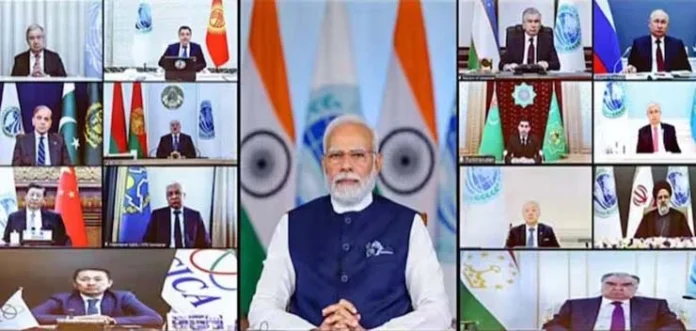The one-day virtual Shanghai Cooperation Organisation (SCO) Summit hosted by India took a strong stand on terrorism adopting the ‘New Delhi Declaration 2023’, which focussed on countering the radicalisation leading to separatism, extremism and terrorism and another on cooperation in the field of digital transformation, said Foreign Secretary Vinay Kwatra said after SCO Summit.
The New Delhi Declaration’ which was formulated by India also proposed four other joint statements on de-radicalisation, sustainable lifestyle to tackle climate change, production of millets and digital transformation.
The nine-page New Delhi Declaration at the end of the virtual summit of the Council of Heads of State of Shanghai Cooperation Organisation (SCO) hosted by Indian Prime Minister Narendra Modi said the world is undergoing unprecedented transformations and is entering a new era of rapid technological development that requires an increase in the effectiveness of global institutions. These fundamental processes are accompanied by stronger multi-polarity, increased interconnectedness, interdependence and an accelerated pace of digitization.
At the same time, threats and challenges are becoming more and more complex, destructive and dangerous, existing conflicts are aggravating and new conflicts are emerging. The growing technological and digital divide, continued turbulence in global financial markets, global reduction in investment flows, instability of supply chains, increased protectionist measures and other barriers to international trade, consequences of the global climate change and COVID-19 pandemic are adding to the volatility and uncertainty in the global economy and creating additional challenges for economic growth, maintaining social well-being, ensuring food and energy security, as well as the implementation of the 2030 Agenda for Sustainable Development. To this end, new approaches are required to promote a more equitable and effective international cooperation.
Using this opportunity with Chinese President Xi Jinping and Pakistan Prime Minister Shehbaz Sharif also present, Prime Minister Modi said some countries “use cross-border terrorism as an instrument,” of their policies and that the SCO should not hesitate to criticise such nations. Delhi has been repeatedly highlighting that Islamabad uses terrorist groups as instruments of “state policy” while Beijing has been blocking the listing of Pakistan-based terrorists at the UN Security Council.
Modi also used the occasion to hit out at Beijing and Islamabad on the China-Pakistan Economic Corridor (CPEC) saying that while executing connectivity projects, it is essential to “respect the sovereignty and territorial integrity,” of member countries of the SCO. The CPEC includes areas in Pakistan-Occupied Kashmir (POK). India also refused to put its signature to the paragraph supporting Chinese President Xi’s pet Belt and Road Initiative (BRI) project and India has since the project was launched by China opposed it since it violates India’s territorial integrity and sovereignty.
Prime Minister Modi welcomed Iran as the newest member of the Shanghai Cooperation Organisation (SCO). Prior to Iran’s joining, the SCO which was formed in 2001 consisted of eight member countries: China, Russia, India, Pakistan, and the four Central Asian countries of Kazakhstan, Kyrgyzstan, Tajikistan, and Uzbekistan.
The paragraph on BRI states “reaffirming their support for China’s Belt and Road Initiative (BRI), the Republic of Kazakhstan, Kyrgyz Republic, Islamic Republic of Pakistan, Russian Federation and Republic of Uzbekistan note the ongoing work to jointly implement this project, including efforts to link the construction of the Eurasian Economic Union and BRI.” This is similar to the Samarkand declaration of 2022.
On terrorism, Delhi Declaration uses language almost similar to that of Samarkand except that instead of word “ultra-nationalism” it uses the word “chauvinism.” The New Delhi declaration states that member states consider it important to build up joint coordination efforts by the international community to counter the activities of terrorist, separatist and extremist groups, paying special attention to preventing the spread of religious intolerance, aggressive nationalism, ethnic and racial discrimination, xenophobia, ideas of fascism and chauvinism.
On this subject, the Samarkand declaration had said that member states deem it important to boost the international community’s joint efforts in countering attempts to involve young people in the activities of terrorist, separatist and extremist groups, and to pay particular attention to preventing the spread of religious intolerance, aggressive nationalism, ethnic and racial discrimination, xenophobia and ideas of fascism and ultra-nationalism. In another change, the New Delhi declaration has substituted the word “deceptive purposes” used in 2022 Samarkand declaration with the words “mercenary goals.”
Russian President Putin thanked SCO leaders for their support for the “Russian leadership in defending the constitutional order, lives and security of its citizens,” which comes days after the failed armed mutiny by the Russian mercenary Wagner group. He said the SCO is “strongly committed to creating a truly just and multipolar world order, an order based on international law and common principles of mutually respectful cooperation between sovereign states with the central, coordinating role of the United Nations.”
On the Ukraine conflict, he said “external forces have been implementing a project near our borders to create from our neighbour Ukraine, a de facto hostile state, an ‘anti-Russia…we are being subjected to a hybrid war, with illegitimate anti-Russian sanctions…I would like to stress that Russia is confidently resisting external pressure, sanctions and provocations….The Russian people are more consolidated than ever.”
Addressing the virtual Summit, Chinese President Xi warned against attempts to foment new ‘Cold War’. “We should keep in mind the overall and long-term interests of our region, and make our foreign policies independently. We must be highly vigilant against external attempts to foment a new ‘Cold War’ or camp-based confrontation in our region,” Xi said.
The Chinese leader felt that nations should “bridge differences through dialogue, and replace competition with cooperation,” and that they should “truly respect each other’s core interests and major concerns,” which appeared to be a pitch for his pet BRI project.
Addressing the Summit, Pakistan Prime Minister Shehbaz Sharif said that the “hydra headed monster of terrorism and extremism,” must be fought with full might and that “any temptation to use it as a cudgel for diplomatic point scoring must eschewed.” In an indirect reference to India, he said religious minorities should never be “demonised in the pursuit of domestic political agenda.”
Underlining the need for counter-terrorism and counter-radicalism, Russian President Vladimir Putin supported ‘New Delhi Declaration’ in the SCO meeting. Putin also thanked PM Modi for organising the summit. “I would like to thank PM Modi, for organising this Summit. Implementation of a lot of documents and the decisions that were prepared for this Summit. Russia supports the New Delhi declaration which gives a consolidated approach to international issues. We will continue to strengthen ties with SCO member states.”
Chairing the summit, Modi talked about the growing importance of the SCO and said, “It is our shared responsibility to understand each other’s needs and sensitivities and resolve all challenges through better cooperation and coordination.”
The virtual summit under India’s presidency was attended by leaders of Kazakhstan, Kyrgyzstan, Tajikistan, Uzbekistan and Iran as well. The presidency of the SCO for the forthcoming period was handed over to the Republic of Kazakhstan. The next meeting of the SCO Council of Heads of State will be held in 2024 in the Republic of Kazakhstan.
– The writer is a senior journalist and media consultant. The views expressed are of the writer and do not necessarily reflect the views of Raksha Anirveda
– The writer is a senior journalist and media consultant. The views expressed are of the writer and do not necessarily reflect the views of Raksha Anirveda.

















